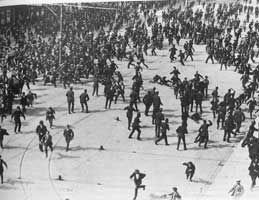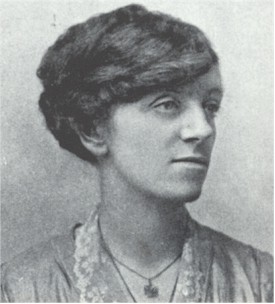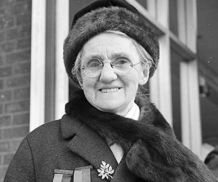
The Irish Citizen Army, or ICA, was a small paramilitary group of trained trade union volunteers from the Irish Transport and General Workers' Union (ITGWU) established in Dublin for the defence of workers' demonstrations from the Dublin Metropolitan Police. It was formed by James Larkin, James Connolly and Jack White on 23 November 1913. Other prominent members included Seán O'Casey, Constance Markievicz, Francis Sheehy-Skeffington, P. T. Daly and Kit Poole. In 1916, it took part in the Easter Rising, an armed insurrection aimed at ending British rule in Ireland.

James Larkin, sometimes known as Jim Larkin or Big Jim, was an Irish republican, socialist and trade union leader. He was one of the founders of the Irish Labour Party along with James Connolly and William O'Brien, and later the founder of the Irish Worker League, as well as the Irish Transport and General Workers' Union (ITGWU) and the Workers' Union of Ireland. Along with Connolly and Jack White, he was also a founder of the Irish Citizen Army. Larkin was a leading figure in the Syndicalist movement.

The Communist Party of Ireland (CPI) is a Marxist–Leninist party, founded in 1933 and re-founded in 1970 and active in the Republic of Ireland and Northern Ireland. It rarely contests elections and has never had electoral success. The party is a member of the International Meeting of Communist and Workers' Parties.
Events in the year 1911 in Ireland.

The Dublin lock-out was a major industrial dispute between approximately 20,000 workers and 300 employers that took place in Dublin, Ireland. The dispute, lasting from 26 August 1913 to 18 January 1914, is often viewed as the most severe and significant industrial dispute in Irish history. Central to the dispute was the workers' right to unionise.

Helena Mary Molony was a prominent Irish republican, feminist and labour activist. She fought in the 1916 Easter Rising and later became the second woman president of the Irish Trades Union Congress.

Jacob's is an Irish brand name for several lines of biscuits and crackers in Ireland and the United Kingdom. The brand name is owned by the Jacob Fruitfield Food Group, part of Valeo Foods, which produces snacks for the Irish market. The brand name is used under licence by United Biscuits, part of Pladis and by Mondelez International in Asia.
Louie Bennett was an Irish suffragette, trade unionist, journalist and writer. Born and raised in Dublin, she established the Irish Women's Suffrage Federation in 1911. She was a joint editor and contributor to the Irish Citizen newspaper. She wrote two books, The Proving of Priscilla (1902) and A Prisoner of His Word (1908), and continued to contribute to newspapers as a freelance journalist. She played a significant role in the Irish Women Workers' Union, and was the first woman president of the Irish Trade Union Congress.

Maria Winifred ("Winnie") Carney, was an Irish republican, a participant in the 1916 Easter Rising in Dublin, and in Belfast—as a trade union secretary, women's suffragist, and socialist party member—a lifelong social and political activist. In March 2024, a statue to her was unveiled on the grounds of Belfast City Hall.

Delia Larkin was a trade union organiser, journalist and actress, born to Irish parents in Liverpool, England. She was influenced by the activities of her brother, James Larkin, to move to Ireland, and was prominent during the 1913 Dublin Lockout. She was active in Irish trade union activities and was a founding secretary of the Irish Women Workers' Union.
Helen Sophia Chenevix was an Irish suffragist and trade unionist. In 1911, she worked with Louie Bennett to form the Irish Women's Suffrage Federation. The two later founded the Irish Women Workers' Union.

Rosanna "Rosie" Hackett was an Irish revolutionary and trade union leader. She was a founder-member of the Irish Women Workers' Union, and supported strikers during the 1913 Dublin Lockout. She later became a member of the Irish Citizen Army and was involved in the 1916 Easter Rising. In the 1970s, the labour movement awarded Hackett a gold medal for decades of service, and in 2014 a Dublin city bridge was named in her memory.

Patrick Thomas Daly, known as P. T. Daly was an Irish trade unionist and politician.
Alice Brady (1898–1914) was a labour activist that was shot and killed during the 1913 Dublin Lock-out. She was shot accidentally in the hand by a worker and died two weeks later of tetanus. The worker was charged but acquitted of her murder. Members from the Irish Women Workers' Union used her funeral as a show of strength. A service was held on Saturday, 4 January 2014 to mark the centenary of Brady's funeral, and RTÉ One broadcast a documentary on the lockout involving descendants of participants and members of Brady's family.
The 1913 Sligo Dock strike in the port of Sligo in northwest Ireland was a labour dispute lasting 56 days from 8 March to 6 May 1913. During the strike, there were numerous clashes on the docks and riots in the town, resulting in one fatality. Occurring six months earlier than the Dublin Lockout, it was regarded as a precursor to that action and a successful application of the Irish Transport & General Workers Union’s strategy for workers rights by James Larkin and James Connolly. It resulted in victory for the workers. James Larkin considered the 1913 victory in Sligo to be a major achievement of the ITGWU.

Walter Carpenter was a prominent socialist and trade union organiser active in Ireland in the early 20th century.

Cissie Cahalan was an Irish trade unionist, feminist, and suffragette.

Jennie Shanahan, was a member of the Irish Citizen Army and fought in the Easter Rising and the Irish War of Independence.
Joseph Harris was an Irish trade unionist and political activist.
Sheila or Sighle Dowling was an Irish republican, socialist, trade unionist, feminist, and a member of Cumann na mBan.













